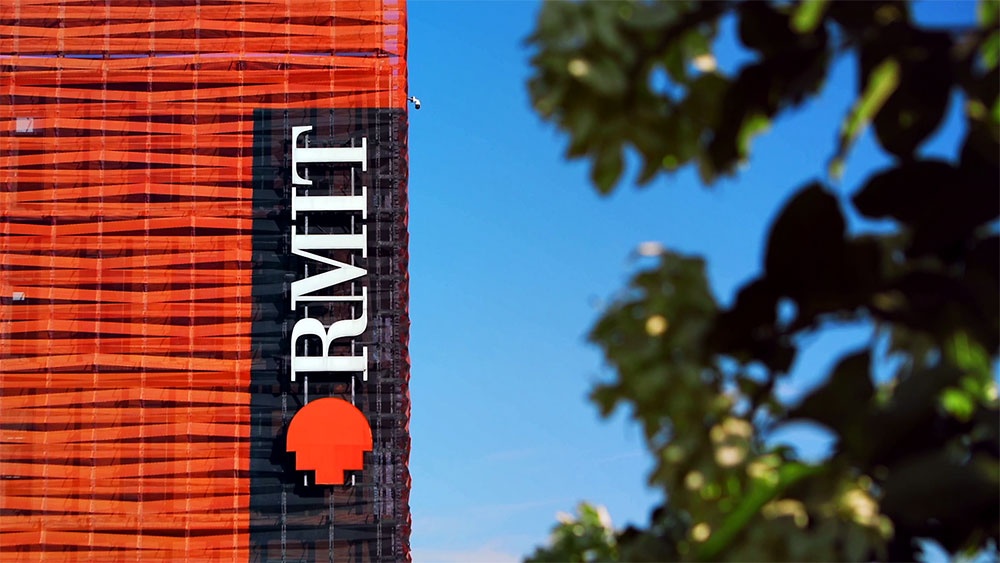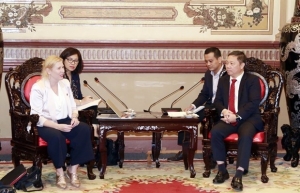RMIT and its goal to create positive impact in Vietnam and beyond
 |
| RMIT and its goal to create positive impact in Vietnam and beyond |
Established 23 years ago following an invitation by the prime minister of Vietnam, RMIT has now grown to more than 12,000 active students, 20,000 alumni, and 1,000 staff, providing an international education that is differentiated by its quality, applied approach, and focus on employability.
The university has a strong reputation as the pre-eminent university, offering a superior student experience with curricular and extracurricular learning activities, industry-integrated learning, and qualifications recognised domestically and internationally.
“We recognise our role supporting Vietnam’s bold aspirations because we know the power of education for individuals, communities, and economies,” said RMIT Vietnam’s pro vice-chancellor and general director Prof. Claire Macken.
“Vietnam’s rapid economic development since the mid-1980s has positioned it as a rising middle power in Southeast Asia. To realise the country’s upper-middle-income vision to 2035 and beyond,” Macken said. “Vietnam will need to cultivate a higher skilled and more adaptive workforce, and shift its economy from manual, unskilled labour to non-manual, skilled work.”
“Our links into industry ensure graduates have the practical skills necessary to succeed in fast-evolving business environments, filling emerging skills gaps, and assisting Vietnam’s transition to a value-added economy. From digital and cultural competency to critical and design thinking and managerial skills, RMIT aims to prepare graduates to become future leaders both nationally and regionally,” she added.
This year marks five decades since Australia and Vietnam established their diplomatic relations. For nearly half of that time, RMIT University is proud to have been an exemplary Australian investor in Vietnam, a contributor to the knowledge economy, and a bridge for people-to-people links.
“RMIT’s entry was facilitated by strong bonds formed through many years of educating Vietnamese students in Australia and fostering educational partnerships in the region,” Macken said. “Then over more than two decades, RMIT Vietnam has become a vibrant part of Vietnam’s education landscape, industry ecosystems, and broader communities, as well as an integral part of the Australia-Vietnam relationship.”
 |
Remaining responsive to emerging needs
Moving forward, RMIT University will continue creating positive impact and addressing shared challenges and opportunities for Southeast Asia.
“Our obligation as a higher education institution is to the communities we serve. Universities are here to contribute to solving the biggest global challenges and we have such a big role to play in achieving the outcomes and finding solutions to those challenges,” Macken explained.
“As RMIT looks to its future, we are committed to setting a direction for RMIT in Vietnam to continue to be a prominent leader in technology, design and enterprise for learners, researchers, and the community. We aim to embrace a greater focus, extending thought leadership, educational offerings, and partnerships into Southeast Asia to drive regional impact around shared challenges and themes,” she added.
Macken introduced the four key strategic focuses where RMIT’s strengths best align to the needs of Vietnam and the region: emerging technologies, smart and sustainable cities, social innovation, and regional collaboration.
“They are critical enablers of Vietnam’s development journey, both socially and economically, as well as the country’s national priorities around Industry 4.0, digital transformation, and rising impact and influence in Southeast Asia,” she emphasised.
 |
For years to come, RMIT Vietnam’s strategic focus includes:
- contributing to an overall uplift of technological capabilities for Vietnam to be positioned in digital industries and the future of digital transformation;
- contributing to development economics and major industries in Vietnam and aligning RMIT Vietnam’s activities with Vietnam’s goals relating to economic competitiveness, socioeconomic development, infrastructure, smart technologies, and the digital economy;
- contributing to regional collaboration, including Australia-Vietnam relations, inputs to policy development, the educational future of Vietnam and quality assurance, border security, and defence;
- contributing the graduates, knowledge, and engagement needed in relation to culture, creativity, and society, including contributions to the environment, sustainability, and a circular economy.
As Australia and Vietnam move forward to a more comprehensive strategic relationship, the newly released strategic plan is a platform for RMIT to simultaneously strengthen its focus on, and impact in, Vietnam.
“Its vision, mission, and ambition empower RMIT Vietnam to continue to strengthen its role as the heart of our impact network in the region and beyond,” Macken concluded.
 | Ericsson and RMIT University collaborate to prepare Vietnamese students for 5G future Ericsson (NASDAQ: ERIC) and Royal Melbourne Institute of Technology (RMIT) on December 9 announced their collaboration for an education initiative on 5G in Vietnam that will help educate Vietnamese students on 5G and emerging technologies. This collaboration will enable RMIT science, engineering, and technology students to participate and contribute to the country’s digital economy and Industry 4.0 transformation. |
 | RMIT committed to advancing Australia-Vietnam education For nearly 25 years, RMIT University is proud to have been an exemplary Australian investor in Vietnam, a contributor to the knowledge economy, and a bridge for people-to-people links. |
 | HCM City, RMIT University strengthen cooperation Vice Chairman of the Ho Chi Minh City People’s Committee Duong Anh Duc received Professor Claire Macken, General Director of Australia’s Royal Melbourne Institute of Technology (RMIT) Vietnam, on June 6. |
What the stars mean:
★ Poor ★ ★ Promising ★★★ Good ★★★★ Very good ★★★★★ Exceptional
Related Contents
Latest News
More News
- State corporations poised to drive 2026 growth (February 03, 2026 | 13:58)
- Why high-tech talent will define Vietnam’s growth (February 02, 2026 | 10:47)
- FMCG resilience amid varying storms (February 02, 2026 | 10:00)
- Customs reforms strengthen business confidence, support trade growth (February 01, 2026 | 08:20)
- Vietnam and US to launch sixth trade negotiation round (January 30, 2026 | 15:19)
- Digital publishing emerges as key growth driver in Vietnam (January 30, 2026 | 10:59)
- EVN signs key contract for Tri An hydropower expansion (January 30, 2026 | 10:57)
- Vietnam to lead trade growth in ASEAN (January 29, 2026 | 15:08)
- Carlsberg Vietnam delivers Lunar New Year support in central region (January 28, 2026 | 17:19)
- TikTok penalised $35,000 in Vietnam for consumer protection violations (January 28, 2026 | 17:15)

 Tag:
Tag:




















 Mobile Version
Mobile Version